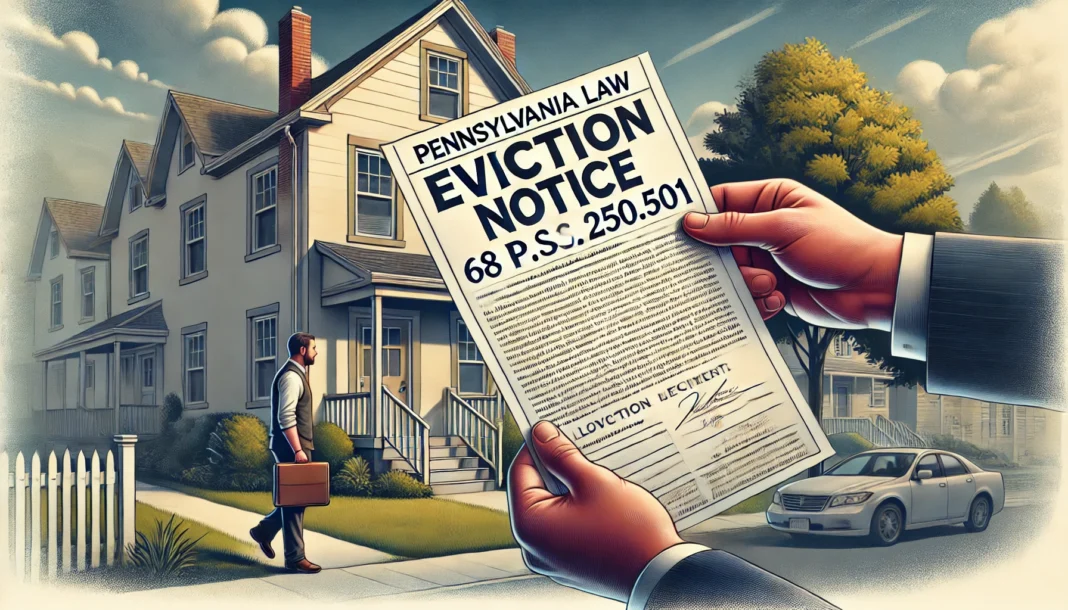pennsylvania law 68 p.s250.501 is a critical piece of legislation that governs landlord-tenant relationships in Pennsylvania.
It’s the rulebook landlords and tenants turn to when a lease gets messy or broken.
The law primarily deals with eviction procedures and outlines what both parties need to do in cases where one side doesn’t uphold their part of the rental agreement.
If you’re a tenant wondering, “Can my landlord just kick me out without warning?” this law has your back.
If you’re a landlord thinking, “How do I legally remove a tenant who’s stopped paying rent?” this law is your go-to resource.
Let’s break it down in plain language to help you understand your rights and responsibilities.
Why Does pennsylvania law 68 p.s250.501 Matter?
For Tenants:
Imagine you’ve been renting your apartment for years and suddenly receive an eviction notice out of the blue.
Without laws like pennsylvania law 68 p.s250.501, landlords could force tenants out without giving them a chance to respond or resolve issues.
This law ensures tenants get proper notice and a chance to challenge the eviction in court if needed.
For Landlords:
On the flip side, landlords rely on this law to enforce their rights.
If a tenant hasn’t paid rent for months or is causing damage to the property, the law provides a legal pathway to reclaim the unit.
Without it, landlords could face endless delays or legal hurdles.

Key Highlights of pennsylvania law 68 p.s250.501
Eviction Notices:
Landlords must provide written notice before evicting a tenant.
The notice period depends on the type of lease and the reason for eviction:
- Non-payment of Rent: Ten days’ notice.
- Lease Violation (other than non-payment): Fifteen days for leases under one year; thirty days for leases longer than one year.
- Holdover Tenant (staying after lease ends): Fifteen to thirty days, depending on the lease duration.
Court Proceedings:
If the tenant doesn’t comply with the notice, the landlord must file a complaint with the local magistrate.
The court sets a hearing date, giving both parties a chance to present their case.
Tenant Rights:
Tenants can argue their case, whether it’s about unfair treatment, retaliation, or other defenses.
The law protects tenants from being evicted without due process.
Landlord Rights:
Landlords can recover unpaid rent, damages, and legal costs if the court rules in their favor.
Common Questions About pennsylvania law 68 p.s250.501
Can My Landlord Evict Me Without a Reason?
No, they need a valid reason outlined in the lease or supported by the law, like non-payment of rent or lease violations.
What Happens If I Ignore the Eviction Notice?
Ignoring an eviction notice can lead to a court order for eviction.
It’s better to respond, negotiate, or show up in court to defend your case.
Can I Stay If I Pay the Rent I Owe?
In many cases, yes.
If you pay your overdue rent before the court hearing, some judges may allow you to stay.
How Long Does the Eviction Process Take?
It varies, but the timeline can range from a few weeks to a couple of months, depending on court schedules and appeals.
Real-Life Examples of How pennsylvania law 68 p.s250.501 Works
Example 1: Non-Payment of Rent
John rents a small apartment in Pittsburgh but falls behind on rent after losing his job.
His landlord gives him a ten-day written notice to pay or move out.
John tries to negotiate but can’t pay in time, so the landlord files a complaint in court.
During the hearing, John explains his situation, and the judge gives him an extra week to vacate.
Example 2: Lease Violations
Sara’s landlord discovers she’s subletting her apartment without permission, violating the lease terms.
The landlord issues a fifteen-day notice to terminate her lease.
Sara argues in court that the landlord had verbally approved the sublet.
The judge reviews the evidence and rules in the landlord’s favor, granting eviction.

Tips for Tenants and Landlords Dealing with pennsylvania law 68 p.s250.501
For Tenants:
- Always read your lease carefully before signing.
- Keep communication open with your landlord to resolve issues early.
- Document everything, from rent payments to repair requests.
For Landlords:
- Follow the law strictly to avoid legal complications.
- Serve proper notice and keep copies for your records.
- Be prepared to prove your case in court with evidence like photos, emails, and payment records.
Resources for More Information
If you want to dive deeper into pennsylvania law 68 p.s250.501, check out these resources:
- Pennsylvania’s Landlord-Tenant Act of 1951
- Housing Rights Center of Pennsylvania
- PA Courts Eviction Process
- Community Legal Services of Philadelphia
- Pennsylvania Landlord Association
pennsylvania law 68 p.s250.501 is the foundation of fair landlord-tenant relationships in the state.
Whether you’re renting or managing properties, knowing the ins and outs of this law can save you time, stress, and money.


